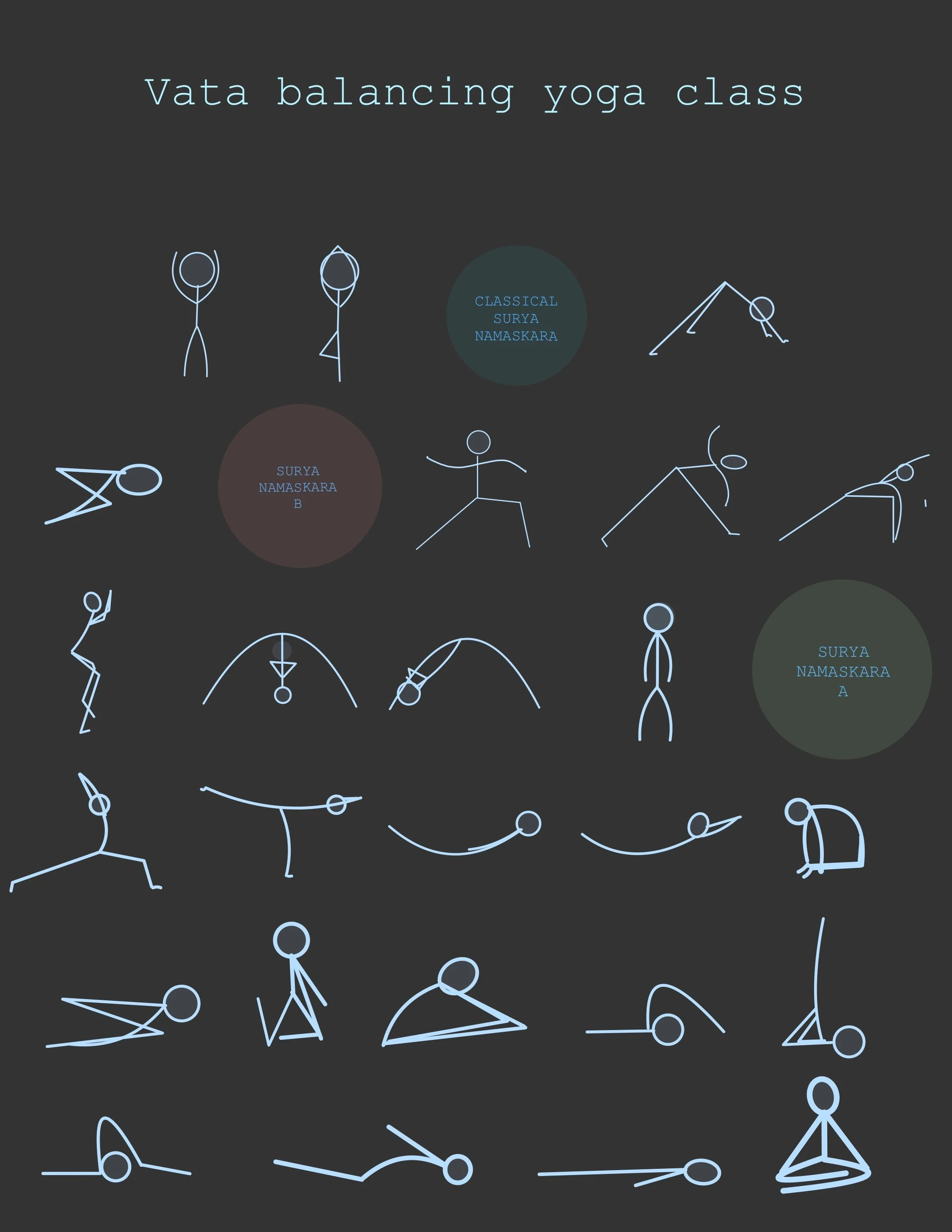Vata Dinacharya
Vata Dosha is very dry, cold, and rough, as well as light, flowing, and expansive. Vata is made up of two of the Pancha Mahabhutas, or five elements, being air and space. This constitution is the most consistent with inconsistency in terms of daily routine. This does not mean you lack the need for routine, in fact, you are particularly vulnerable to becoming imbalanced and ill when you do not have a routine that includes regular periods of both rest and activity. When you accumulate too much of the vata elements of space and wind, this imbalance can manifest as illness including anxiety, arthritis, insomnia, headaches, and digestive disorders.
A proper morning routine for Vata Dosha would consist of regularly waking before the sunrise every morning, proper rest is a minimum of 8 hours of sleep. Drink 2 cups of warm water after brushing your teeth and scraping your tongue. Make a habit of proper elimination or bowel movements before starting your day. Practice gentle yoga, breathing techniques, and meditation. Set an intention for the day such as “today I feel centered and joyful in everything I do.” Wear clothing made with soft fabrics in earth tones and mild pastel shades, which calm Vata types. Doing nasya in the morning will clear out any congestion that has built up. Doing abhyanga (oil body massage) with Vata balancing oil before your morning shower will allow the oil to soak into your skin but won’t leave you with excess oil. Eating a healthy breakfast with awareness is very important. Perform your morning work and activity. Focus on one thing at a time. The brain can’t actually multitask, so trying to type an email while answering a call and planning a trip will only create Vata imbalances in your mind-body system. Throughout the day, maintain awareness of keeping yourself relaxed both physically and mentally.
Transitioning into the midday routine for Vata, make sure to eat lunch between noon and 1pm in a calm, peaceful environment. Lunch should be the largest meal of the day because your digestive fire is strongest at this time. Eat foods that are warming, fresh, and well cooked; avoid dry or uncooked foods, especially salads and raw fruits and veggies. Consume only freshly cooked meals while being mindful of contributing all six tastes (sweet, sour, salty, bitter, spicy, and astringent). Avoid raw or uncooked foods, as well as cold beverages. Have foods that are moist and oily. Stop eating when you are satisfied but not extremely full then sit quietly for 5 or so minutes after finishing. If you feel tired after lunch, it is okay to take a nap between 2pm and 4pm.
During evening time, Vata’s intention should be relaxation and winding down. When you are finished with your daytime activities (ie. work, etc.) practice at least 5 minutes of meditation to start out with, then work your way up to 15 minutes, slowly working towards an hour or whatever feels good for you. This will calm your body and let your mind know that this time is for rejuvenation through stillness. Give yourself time to wind down before dinner, you may feel good getting some light exercise or simply just getting outside. Dinner should be on the light side, during sleep you don’t want to be sitting with food in your stomach. Being very full before bedtime may cause irregular sleep. Adding ghee to your meal will improve digestion and bowel movements. Be mindful of the time you eat so that it works for you to fall asleep. Giving your body time to digest your food is extremely important before laying down and going to sleep. You want to give yourself a gap of about 2-3 hours between dinner and sleep. Going to bed before 10pm on a consistent basis and waking at the same time as well will get your internal clock on a healthy schedule. Be consistent with yourself, let your mind know when you’ll be doing things so life can essentially get progressively easier.
Take your time to get familiar with what works for you, bring one change in at a time. Start with abhyanga, try some breathing exercises, then incorporate yoga and/or meditation. Starting so many new practices can be overwhelming, but we are trying to calm your whole being, so whatever feels like it is helpful, that is what you should be doing. Trial and error is not your enemy. Everything is constantly changing and adapting, be ready for the ebb and flow of life, stay grounded and sure of yourself. Just like we are all different, each of the seasons arrives with its own unique personality too. We can support an improved state of balance throughout the year by making a conscious effort to live in harmony with the cycles of nature and by making small adjustments in our routines in order to accommodate the arrival of each new season. Similarly, if we are dealing with imbalances that do not line up perfectly with our constitutions, it may be helpful to adopt a routine that pacifies the dosha that is most aggravated.
